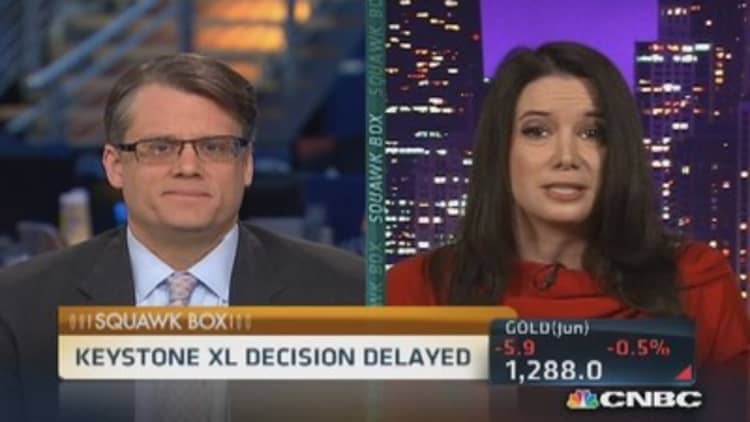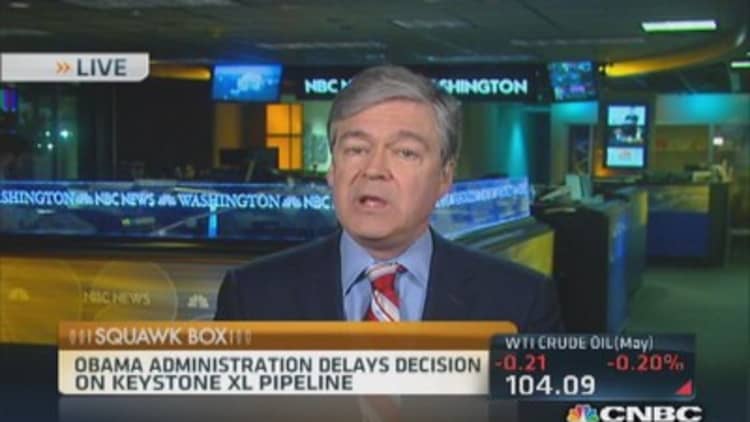
Politicians make their living shading the truth. But even by those low standards, Democratic National Committee Chair Debbie Wasserman Schultz offered a whopper on Sunday, saying that the Obama administration's latest non-decision on the Keystone XL pipeline was not political.
"As a member of Congress who represents hundreds of thousands of people in south Florida, I want to make sure the right decision is arrived at and that the president makes that decision carefully and doesn't factor politics into his decision, which I don't think he is," Wasserman Schultz said on NBC's "Meet the Press," somehow managing to maintain a straight face.
The decision to once again punt on Keystone was, of course, entirely political.
The White House in its Friday-of-a-holiday-weekend news dump cited an ongoing legal dispute in Nebraska over approval for the Keystone route through the state as the reason for the latest in years of delays.
But there is no reason that dispute should change the federal government's decision on whether building the pipeline is in the national interest.
President Obama's own State Department has now twice concluded that the pipeline would cause no net harm to the environment. And State is involved only because the pipeline crosses the Canadian border, which does not, in fact, extend into Nebraska. Indeed, it seems fairly clear that on the merits, the administration would likely have approved the pipeline months if not years ago.
Read More
But there are at least 100 million reasons why the president has held up the decision.
Those reasons live in the bank account of hedge fund manager Tom Steyer who has pledged to spend $100 million helping Democrats avoid disaster in a 2014 midterm election where their Senate majority is in serious jeopardy. Steyer's No. 1 issue? Stopping the Keystone pipeline.
The San Francisco money manager on Friday declared the latest delay "rotten eggs" for pipeline builder TransCanada and "good news on Good Friday for those who oppose Keystone as not being in our nation's best interest."
The delay, however, was not at all good news for vulnerable red state Democrats, including Sens. Mary Landrieu of Louisiana, Mark Pryor of Arkansas and others.
Read More What Happens if the Keystone XL Pipeline Isn't Built?
Landrieu has the most to lose given that she is a strong proponent of the pipeline, which would deliver crude product from Alberta's oil sands to the Gulf Coast for refining and sale on the global market.
And the Louisiana senator, who already trails Republican Bill Cassidy in early polls, has cited her influence in Washington as a key reason for voters to keep her on the job. She used her first ad of the campaign to do that very thing (immediately drawing rebukes from Republicans for recreating scenes in the Senate).
But now Landrieu, who chairs the Senate Energy and Natural Resources Committee, has demonstrated a total inability to actually influence the administration on a key decision that would impact the economy in her state.
Landrieu on Friday blasted the administration's decision as "irresponsible, unnecessary and unacceptable." And some make the case that Keystone gives her an opportunity to create distance between herself and an unpopular president.
That may be true but is likely swamped by the fact that Landrieu's key selling point—I can deliver for Louisiana!—is now fundamentally undermined.
If Landrieu goes down in November, as she very well may, she can probably thank the Obama White House for her defeat.

The decision to punt is largely, though not entirely, about Democrats desire to use Steyer's money to counter the hundreds of millions of dollars that the billionaire Koch brothers and other conservatives are likely to spend to help Republicans pick up the six seats they need to take the Senate.
But it is also very much about the likely makeup of the 2014 electorate. Turnout always drops significantly in nonpresidential years, often dropping to close to 40 percent or below. And Democrats fear their numbers could be even worse than usual given generally low spirits in the party over the troubled (though improving) rollout of the health-care law and the generally lackluster economy throughout Obama's tenure.
Read More I'd vote 'yes' on Keystone pipeline: Warren Buffett
Those who do show up are likely to be hardcore elements of the party base including younger women, minorities and environmentalists. The base strategy is reflected in the administration's focus on the minimum wage, income inequality and gender pay disparity.
And the White House clearly believes it cannot afford to make a major decision on Keystone that would be viewed on the activist left as a massive sellout of the environmental movement. Now the decision can wait at least until after the midterms, if not much longer.
But the big risk is that even Tom Steyer's millions and a slightly less disgruntled activist base will not be able to save the Mary Landrieus of the world. The Senate may still slip out of Democratic control, making the Keystone decision the least of Obama's problems in the final two years of his presidency.
—By Ben White. White is POLITICO's chief economic correspondent and a CNBC contributor. He also authors the daily tip sheet POLITICO Morning Money [politico.com/morningmoney]. Follow him on Twitter @morningmoneyben.


